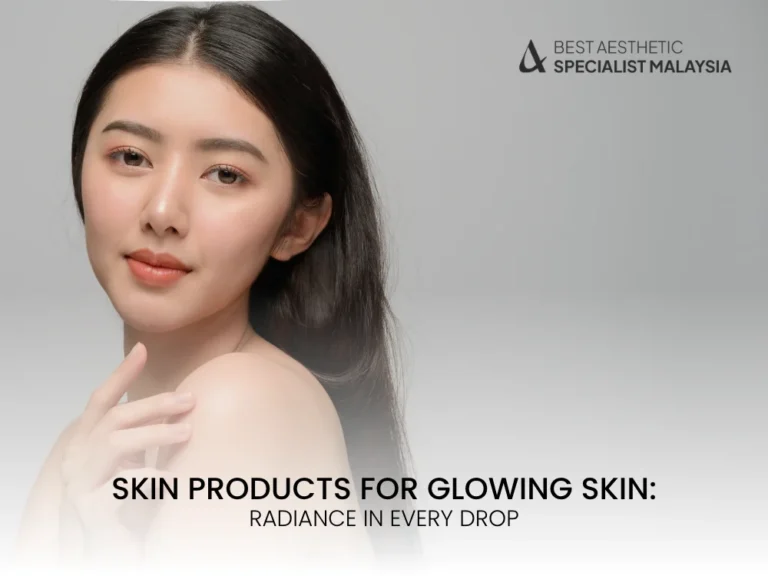In today’s beauty world, radiant skin isn’t just a trend—it’s a standard. A luminous, healthy-looking complexion reflects not only skincare commitment but also inner vitality. If you’ve been on a mission to achieve that enviable glow, you already know that a strategic skincare routine starts with choosing the right skin products for glowing skin.
But with endless options flooding the shelves and online carts, it can be overwhelming. Let’s break down the essentials and uncover what really works to boost your natural radiance.
What Truly Gives Skin That Glowing Look?
Glowing skin isn’t about glittery highlighters or temporary fixes—it’s a reflection of your skin’s health and how well it’s being cared for, both inside and out. That unmistakable radiance comes from hydrated cells, balanced oil production, and regular cell turnover that reveals fresh, supple skin. When your skin is nourished, exfoliated, and shielded from external aggressors, it naturally appears smoother, more even-toned, and luminous.
Hydration plays a central role. Dehydrated skin tends to look dull, feel tight, and show fine lines more prominently. Drinking water throughout the day helps, but topical hydration—through humectants like hyaluronic acid or glycerin—is just as crucial. These ingredients draw moisture into the skin, plumping it from within and enhancing light reflection on the surface.
A healthy diet is your skin’s long-term investment. Nutrient-rich foods such as avocados, sweet potatoes, salmon, and leafy greens deliver essential vitamins and omega fatty acids that support collagen production, elasticity, and barrier function. Antioxidants like vitamin C and E help fight oxidative stress, preventing the dulling effects of pollution and UV exposure.
Proper sleep is often underestimated. During sleep, your body repairs and regenerates skin cells. Skimping on sleep disrupts this healing process, leading to puffiness, dark circles, and a loss of vibrancy. Aim for 7–9 hours of quality rest, and don’t forget to cleanse your face before bed to let your nighttime skin products for glowing skin work effectively.
Consistency in skincare pays off over time. A glowing complexion doesn’t happen overnight—it’s the result of sticking to a daily routine that includes cleansing, treating, moisturizing, and protecting. Each step supports skin health, and skipping any one of them can hinder your progress.
Sun protection is non-negotiable. UV rays are among the most significant contributors to premature aging and uneven skin tone. Daily sunscreen not only prevents damage but also allows your skincare efforts to shine—literally. Skin products for glowing skin like niacinamide and vitamin C work better when protected from environmental harm.
The right skincare products serve as your support system. Serums rich in antioxidants, moisturizers fortified with ceramides, and gentle exfoliants with AHAs or BHAs all work in harmony to maintain that glow. But even the best products can’t perform miracles alone—your lifestyle and internal health must align to achieve truly radiant skin.
Ultimately, glow is a synergy. It’s not just about what’s in your bathroom cabinet, but also your daily habits, stress levels, and commitment to wellness. Glowing skin is a sign that your body is in balance—and it’s well worth the effort.

Skin Products for Glowing Skin: Cleansers
Your glow starts with a clean canvas. Cleansers remove impurities and excess oil, prepping your skin to absorb nutrients. Look for:
- Gel or foam cleansers for oily and combination skin
- Cream or milk cleansers for dry and sensitive skin
- Micellar water for a gentle, residue-free clean
Ingredients to love:
- Glycerin for hydration
- Green tea extract for antioxidant benefits
- Salicylic acid for gentle exfoliation and pore clarity
Avoid harsh sulfates and alcohol-based cleansers, which can strip the skin and leave it looking dull.
Skin Products for Glowing Skin: Exfoliators
Dead skin buildup is one of the biggest barriers to a glowing complexion. That’s where exfoliators come in—clearing away the old to let the new shine through.
Types to consider:
- Chemical exfoliants (AHAs like glycolic acid, BHAs like salicylic acid) gently dissolve dead cells.
- Physical scrubs (with fine beads or natural enzymes) manually buff away flakiness.
- Enzyme exfoliators from papaya or pineapple offer mild exfoliation for sensitive skin.
Limit exfoliation to 1–3 times per week, depending on your skin type.
Skin Products for Glowing Skin: Serums
If there’s one product that transforms skin overnight, it’s a serum. These concentrated formulas dive deep to repair, brighten, and hydrate.
Look for serums with:
- Vitamin C – brightens and neutralizes free radicals
- Niacinamide – evens tone and reduces redness
- Hyaluronic acid – hydrates and plumps
- Licorice root – reduces hyperpigmentation
Apply after cleansing and before moisturizing to lock in active ingredients for maximum glow.
Skin Products for Glowing Skin: Moisturizers
Even oily skin types need moisture. Dehydration can cause dullness, rough texture, and premature fine lines.
Choose:
- Gel-based moisturizers for oily or acne-prone skin
- Creams and balms for dry or mature skin
- Lightweight lotions for balanced skin types
Look for:
- Ceramides to strengthen the skin barrier
- Squalane for lightweight nourishment
- Aloe vera for calming hydration
Moisturizing twice a day keeps the skin supple and resilient.

Skin Products for Glowing Skin: Sunscreens
Nothing destroys skin radiance faster than unprotected sun exposure. UV rays accelerate aging, dark spots, and dullness. That’s why SPF is non-negotiable.
Opt for:
- Broad-spectrum SPF 30 or higher
- Mineral sunscreens with zinc oxide for sensitive skin
- Tinted sunscreens for added glow and even tone
Reapply every 2 hours when outdoors—even on cloudy days. A consistent SPF habit is your glow’s best defense.
Skin Products for Glowing Skin: Face Oils
A few drops of the right facial oil can be the difference between “good skin” and “wow, your skin is glowing.”
Great oils for glowing skin:
- Rosehip oil – rich in Vitamin A and essential fatty acids
- Argan oil – lightweight hydration and elasticity boost
- Marula oil – antioxidant-rich and great for smoothing texture
Use oils after your moisturizer or mix with foundation for a dewy finish.
Masks That Revitalize Instantly
Face masks offer intensive treatments for instant skin boosts. For radiance, look for masks that hydrate, brighten, and detoxify.
Top mask types:
- Clay masks to clarify and reduce congestion
- Sheet masks soaked in serums to hydrate and brighten
- Overnight masks to repair while you sleep
Use 1–2 times per week depending on your needs.
Key Ingredients That Enhance Glow
Ingredient | Benefits | Commonly Found In |
Vitamin C | Brightens, fights pigmentation | Serums, creams |
Hyaluronic Acid | Deep hydration, plumpness | Serums, moisturizers |
Retinol | Cell turnover, smooths texture | Night creams, serums |
Niacinamide | Refines pores, evens skin tone | Serums, moisturizers |
Peptides | Firming, anti-aging | Anti-aging formulas |
Choose products that combine these ingredients for a synergistic glow effect.
Tips for Maximizing Product Benefits
To get the most out of your skin products for glowing skin, it’s not just what you use—but how you use it. Layering your skincare in the correct order ensures that each product penetrates effectively and delivers optimal results. A typical order should follow: cleanser → exfoliant → toner (optional) → serum → moisturizer → SPF (during the day). Starting with the lightest consistency and working toward heavier formulas allows active ingredients to absorb without being blocked.
Timing is everything. Don’t rush your routine—each layer should be given a minute or two to fully absorb before moving on to the next. For instance, serums packed with vitamin C or hyaluronic acid need that extra moment to sink in before applying moisturizer, which acts as a sealant. Rushing the process can dilute results and even lead to pilling on the skin surface.
Never skip SPF—indoors or out. While it’s obvious you need sunscreen on a sunny beach day, indoor exposure to UVA rays through windows or blue light from screens can still trigger premature aging and dullness. A broad-spectrum sunscreen with SPF 30 or higher shields your skin and preserves the benefits of glow-enhancing products.
Support your skin from within. Hydration is not just topical. Drinking enough water and eating a diet rich in antioxidants, such as berries, leafy greens, nuts, and seeds, enhances your glow from the inside out. These nutrients fight free radicals, reduce inflammation, and promote skin elasticity, making your topical products work even better.
Less is often more. While it’s tempting to try every trending serum, overloading your skin can backfire. Introduce new products gradually and observe how your skin reacts. Especially when dealing with actives like AHAs, BHAs, or retinol, moderation ensures that your skin barrier remains intact and receptive.
Customize your routine based on the time of day. Your skin’s needs vary between morning and night. During the day, focus on protection with antioxidants and SPF. At night, prioritize repair with nourishing serums and moisturizers. This rhythm not only aligns with your body’s natural processes but also makes the most of each product’s unique properties.
FAQs
1. What skin products for glowing skin give the fastest results?
Vitamin C serums, hydrating masks, and exfoliants show quick results, often within days. Pair with sunscreen to maintain glow.
2. Can I use multiple skin products for glowing skin at once?
Yes, layering is key—but be cautious not to mix active ingredients like retinol and AHAs unless recommended.
3. Are natural skin products for glowing skin better?
Natural ingredients like aloe vera, turmeric, and rosehip oil are excellent, but synthetic formulations can be just as effective if well-formulated.
4. Is a skincare routine essential for glowing skin?
Absolutely. Consistency is the secret weapon. A daily routine tailored to your skin type delivers long-term radiance.
5. Do face oils clog pores?
Not all. Non-comedogenic oils like rosehip and argan are safe for most skin types, including acne-prone.
6. How long does it take to achieve naturally glowing skin?
Depending on your skin type and routine, visible results typically appear within 2 to 6 weeks with consistent care.
7. Can diet affect skin glow?
Yes! A diet rich in antioxidants, vitamins A, C, and E, plus hydration from water-rich foods, greatly improves skin radiance.
8. Does sleep really influence glowing skin?
Absolutely. Quality sleep boosts cell regeneration and reduces dark circles and dullness, enhancing overall glow.
9. What ingredients should I avoid for glowing skin?
Avoid harsh sulfates, parabens, and high concentrations of alcohol, which can strip moisture and dull the skin.
10. Are skin products for glowing skin suitable for all ages?
Yes, but formulations vary. Teens may prefer oil-control serums, while mature skin benefits from collagen-boosting products.
11. Is sunscreen necessary even if I stay indoors?
Yes, indoor lighting and screens emit blue light that can affect skin tone. Use SPF daily for maximum glow retention.
12. Can stress dull your skin glow?
Definitely. Chronic stress increases cortisol, which can trigger breakouts, dryness, and dullness. Mindful habits help restore glow.
Final Thoughts
Achieving a radiant complexion isn’t a mystery—it’s about choosing the right skin products for glowing skin and using them consistently. From brightening serums and soothing masks to essential SPF, each product plays a role in revealing your healthiest, most luminous skin.
Your glow isn’t just skin deep—it reflects your overall well-being. So hydrate, nourish, and protect your skin, and let your natural beauty shine through every day.

